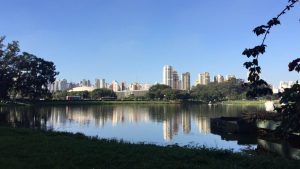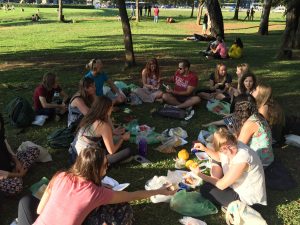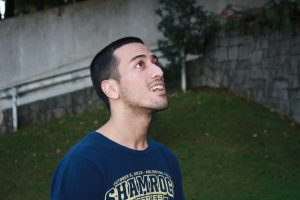
Human Rights and Sustainability in Brazil
By Omar Hassan
It feels as though just yesterday I was on a plane headed to San Paolo. Looking back I am very grateful for the experience and knowledge I’ve gained and feel very privileged to have been a part of such an amazing experience with the best group of people.
Amongst the many situations and encounters I experienced during this trip, I’ve learned the most from meeting the Ministerio publico and the BRT system’s representatives. In addition, I found the indigenous people’s sustainable lifestyle very enlightening and I was able to learn a lot by observing them. I try to incorporate what I’ve learned from this trip into my life today. What I’ve found most challenging is the difficulty of replicating their sustainable lifestyle back in the United States. Life here is much more consumer driven and as a result much harder to stay both competitive and sustainable.
As I mentioned previously, the BRT system had a huge impact on me since I saw how efficient and sustainable it was. I truly believe Egypt and many other countries that have an outdated transportation system could benefit from it. I was fascinated by the organization and attention to the detail, from the color coordinated buses to the advanced onboarding and off boarding systems, which reduce time and as a result decrease costs. The BRT system really made me realize that you can be both sustainable and economical.
After seeing and experiencing the simple lifestyle of the indigenous people firsthand, it made me appreciate the simple approach to life. It is very difficult being surrounded by consumers who strive to always have the latest and greatest things in life while attempting to maintain a sustainable life. Ultimately what I’ve realized after this trip is that little things go a long way when it comes to sustainability. I’ve become much more conscious of my decisions and try to always take the environment and local community into consideration.
Although the majority of my takeaways from this trip were positive, I was disappointed by some of the Brazilians’ desire to become more westernized and not realizing and appreciating the benefits of their indigenous culture. Their pride was evident in the rural areas; however, some of the more urbanized people in cities such as San Paolo did not embrace their culture and heritage. I spoke with several people who have never visited the Amazon, knew nothing about the culture and seemed very interested in learning more about our western culture instead of their own.
After experiencing the scarcity of water firsthand, I started to really appreciate and conserve water. I implemented a much more efficient irrigation system for my yard, which reduced my household’s water consumption by 30 percent. I have also changed my shopping habits to support local businesses, especially local farmers. Instead of grocery shopping at the Safeway store, I have since started going to the weekly local farmers market where I am able to promote local and sustainable farming.
My biggest takeaway from this trip was realizing the impact we have as individuals by changing little things in our day-to-day activities that have huge impacts on our environment and society. I feel as though it is my duty to teach others what I have learned, and continue to learn everyday. I am very excited to continue living a sustainable lifestyle, and applying the valuable lessons I’ve learned in the future as I start my career.




